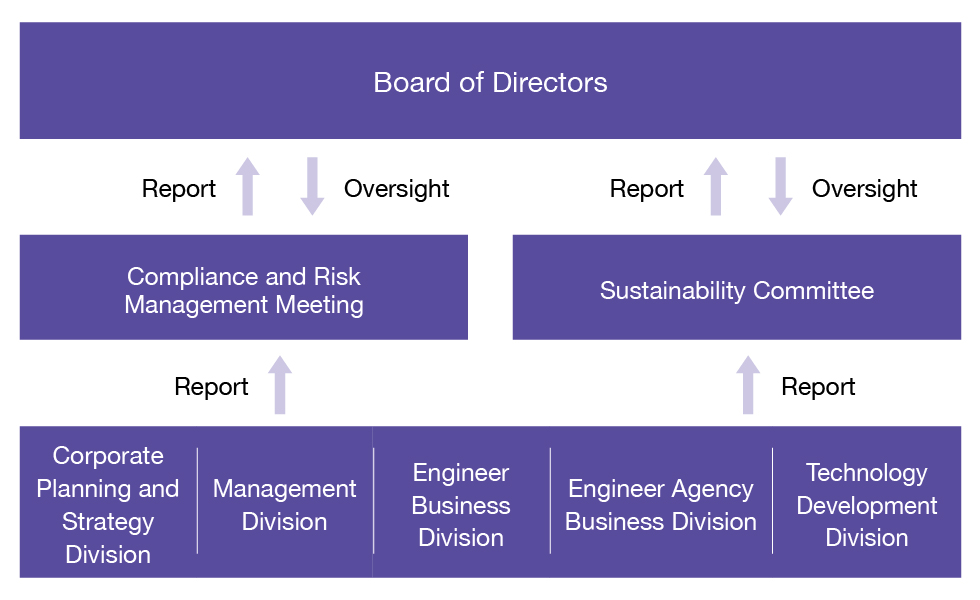Our company operates in the human resources business, and has signed the United Nations Global Compact and supports its Ten Principles. As such, we recognize the importance of respecting human rights within our supply chain. We have already implemented initiatives related to human rights. Our Basic Sustainability Policy includes the goal of achieving “happiness for all employees,” and places the respect for human rights as one of eight “materiality (material issues)” that should be prioritized. The UN’s Guiding Principles on Business and Human Rights (UNGP) clarify the responsibility companies have to respect human rights, and recent years have seen this become an increasingly important issue in regard to business continuity. Taking into account our previous efforts and the social background, we established our Human Rights Policy in February 2024. This policy will be an integral part of our business activities going forward, and we will encourage our suppliers to do the same, thereby further promoting our efforts to respect human rights.
1. Basic view on human rights
2. Key international human rights norms that this policy comp
3. Scope
4. Initiatives to ensure human rights are respected in our business activities
5. Governance
6. Human rights due diligence
7. Remediation and relief
8. Education and training
9. Information disclosure
10. Dialogue and discussion with stakeholders
Artner considers human rights to be a key sustainability issue and has established the Sustainability Committee under the direct supervision of the Board of Directors to establish human rights-related sustainability policies, targets, and action plans; manage and evaluate progress toward these targets; deliberate on individual measures; and report to the Board of Directors.

We have established a human rights due diligence system
through which we identify negative impacts on human rights
and work to prevent and mitigate them.
As part of our efforts to further promote sustainability activities,
we conducted a questionnaire-based survey of our partners on
their basic stance, respect for human rights, and health and
safety issues. We also assessed the status of their human rights
initiatives, organized the issues, and formulated a three-year
roadmap.
Going forward, we will use the results of the questionnaire to
conduct a human rights risk assessment, taking into account
the impact on our business, to identify material human rights
issues.
In addition, because the circumstances surrounding human
rights are constantly changing, we will continue striving to keep
current with the latest information and human rights standards,
as well as regularly review our procedures and priority human
rights issues as necessary.

In order to better understand the status of initiatives related to
human rights, we conducted a questionnaire-based survey on
respect for human rights and health and safety issues, targeting
the suppliers with whom we do the most business.
In the future, we will conduct a human rights risk survey that
targets more suppliers with more detailed questions. We will
also check the status of actions taken in response to the priority
issues identified through human rights due diligence, and if
necessary, we will conduct further fact-finding surveys and
external audits to address any apparent or potential human
rights violations.
We have established a helpline to receive any reports on compliance
violations and inquiries related to human rights and
anti-corruption, and take steps as necessary for relief and
remediation upon investigation.
We strictly enforce the confidentiality and protection of whistleblowers’
personal information and prohibit the disadvantageous
treatment of whistleblowers based on their reports.
During the current fiscal year, there were 0 consultations regarding
human rights.
All employees at our company receive ongoing training that gives them basic views on how to think about human rights, and that raises awareness about human rights.
Human Rights Training
| Training theme | Description | ||
|---|---|---|---|
| 2024 | Human rights | (1) What are human rights? (2) Outline of the main human rights risks that companies should consider (3) The need for corporate human rights efforts and their impact (4) Artner’s human rights efforts (5) Artner’s human rights policy |
|
| 2023 | Human rights |
(1) What are human rights?
(2) Increasing attention on how companies are addressing human rights (3) Subjects (rights holders) whom companies should respect (4) Human rights risks
(5) Human rights fields that companies should respect
(6) Main impacts of adequate/inadequate human rights efforts (7) Artner’s human rights policy |
|
| 2022 | Diversity measures(promoting understanding of LGBTQ+) |
(1) Basics of diversity management (diversity and inclusion management) (2) Basics of LGBTQ+ (3) Panel discussion (on personal experiences) |
|
| 2021 | Diversity measures (promoting understanding of LGBTQ+) |
(1) Basics of diversity management (2) Basics of LGBTQ+ and SOGI (3) What we can do: specific actions by allies |
|
Artner recognizes that human rights initiatives are required not only by the Company, but also by our supply chain. We have therefore established a procurement policy and will comply with laws and regulations and respect basic human rights as a responsible member of society. We share our approach to human rights with our suppliers and strive to identify human rights risks in the supply chain as part of our procurement process.